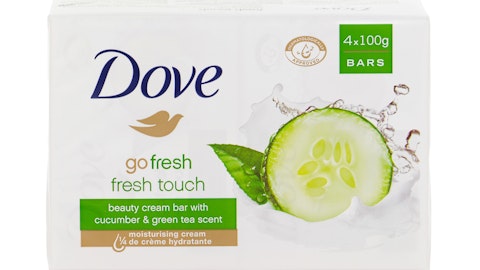Turnover for the quarter was €15.8 billion, down 3.8% against last year. The underlying sales growth of 5.2% was offset by acquisitions and disposals with the sale of the swab brand being the main factor there. Currency impact was a negative 8%, which comprises a negative impact of minus 10.3% from the euro strengthening against our key currencies and 2.6% of extreme price growth from hyperinflationary markets. Based on spot rates today, we now expect an exchange rate effect of around minus 5.5% on full year turnover. On the same spot rate basis, the currency impact on full year underlying earnings per share will be around minus 9%. Our outlook for the year remains unchanged. We expect underlying sales growth to be above 5%, with price growth continuing to moderate.
We will continue our top line momentum by investing for growth in BMI, in R&D and in CapEx whilst further embedding the new organization of our five business groups and Unilever business operations. Net material inflation for the year is expected to be around €2 billion, and we’re confident that we will deliver a modest improvement in underlying operating margin for full year 2023, with the recovery in gross margin, reinvested in marketing spend behind our brands. And with that, let me hand you back to Hein.
Hein Schumacher: Thank you, Graeme. When I spoke to you in July, just a few weeks after taking up the role, I said that I would come back to you in October with a more considered view of the business. And I’m delighted to have that opportunity today. Over the course of the next 40 minutes or so, I will set out my initial reflections, look at strength and in particular, the opportunities as I see them, outline how those opportunities are being captured in a target detection plan; and finally, set out what all this means in terms of value creation. And of course, I will leave plenty of time at the end for questions and comments. The last three months have been very intense, but also, I believe, productive. And in that time, I have followed up my earlier trips to the U.S., China and India with visits to other important Unilever markets in Southeast Asia, Africa and parts of Europe.
I heard the views of our own people through a highly structured listening and engagement program, which has enabled me to connect with or hear the views of several hundred Unilever employees. Engaged extensively with Unilever leadership executive and with a wider group of the Company’s most senior leaders, including through a number of specific work streams, the relevance of which I will come back to later. Gone through an annual strategy review exercise with the Unilever Board of Directors and followed up my earlier engagement with investors by meeting with key business partners, including customers, banks, agencies and suppliers. And finally, I had the privilege to engage on Unilever’s sustainability agenda with policymakers and with some of our NGO partners at last month’s UN General Assembly meeting in New York.
And throughout this time, I’ve listened openly, intently and respectfully. I’m now a little over 90 days as CEO of a company that has been around just in his present form for over 90 years. I stand before you here today, therefore, with humility, but also with real conviction, the conviction that there is potential to be realized and value to be unlocked. All the activity of the last three months has reaffirmed my initial view of the business, namely that Unilever is a company of many strengths. Whether in the strength of its category positions with 80% of the business in number one or two positions, in the penetration of its brands, with over 3.4 billion daily users of Unilever products, in the depth and sophistication of its channel footprint in the caliber of its people in the scale of its reach, especially in future growth markets.
In the quality of its R&D capabilities, with 20,000 patented innovations and in its leadership and know-how on sustainability, and these strengths and qualities are felt across all of the five business groups. I’ve reviewed the business groups in some detail over the last three months, assessing the contribution each can make to Unilever. And from all this, I am clear that the best value creation opportunity we have comes from driving accelerated levels of growth, quality organic growth across all of these businesses. In the interest of time, I don’t intend to dwell further on our strengths today. Not because they aren’t important, they are, of course. But from all my engagement so far, I feel that these strengths are widely recognized, understood and obviously a tribute to all who have built this business over a long period of time.
But the best way to honor the past is to be honest, about the present. And that means recognizing that across a number of important metrics, the quality of performance has fallen short. Taken over the last six years, volume growth has been lagging. Competitiveness has struggled to get to and stay at the levels expected and that’s not good enough. Gross margin has been in decline and EPS growth stagnant. And we see this reflected in the TSR performance on a three-year basis that falls below the Company’s stated ambition. Remedying that and returning Unilever to the top three of its TSR peer group is a top priority. And we know what it will take. Stepped up volume growth, the rebuilding of gross margin, consistent delivery and generating strong cash and attractive returns, and I’m confident that we can do that.
But it does mean confronting some harsh realities. For example, we have outstanding science and technology capabilities, yet I see them dissipated across too many small projects and not leverage sufficiently across big multi-category platforms, our product superiority scores are good and actually improving, but we need to be brilliant at executing across all consumer benefits, and we’re not there yet. And this means going from technical product superiority to a consumer perceived overall brand superiority. Let’s turn to our work on sustainability, which is truly pioneering. Unilever’s reputation in this area is well deserved. But again, our efforts are being spread too thinly. We have too many long-term commitments that fail to make a sufficient short-term impact.
And the latter is what the world needs right now. We have a modern globally connected supply chain, but not yet the disciplined focus on net productivity that I would expect. In other words, we need gross margins to improve faster then the trajectory we are currently on. We have an outstanding global talent base, but not the performance culture to match and converting the talent of our people to step up performance could be one of our biggest unlocks and I have a great passion for that. We have incredible global reach and a wonderful portfolio of brands, as I said, but insufficient discrimination when it comes to prioritizing the biggest brands and the biggest opportunities. Our focus on purpose is loadable and it inspires many people to join and stay with Unilever.





